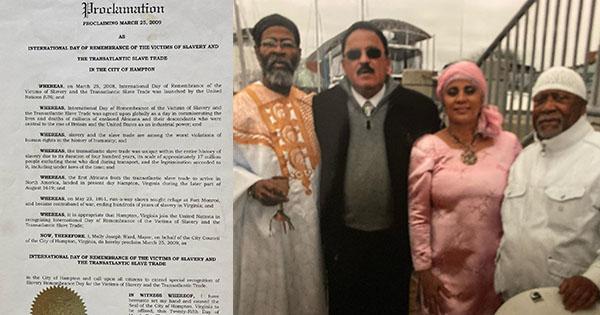By Venita Benitez
Pastor Larry Gipson, the late Calvin Pearson (the Founding father of Mission 1619), Venita Benitez, and the late Walter Walker
Nationwide — National Freedom Day honors and pays tribute to the Worldwide Day of Remembrance of the Victims of Slavery and the Transatlantic Slave Commerce, commemorated on every succeeding March twenty fifth, globally as a day commiserating the lives and deaths of tens of millions of enslaved Africans and their descendants. This vital day serves as a robust reminder of the resilience and humanity of those that endured the atrocities of slavery, whereas additionally calling for reflection and motion to fight right this moment’s modern-day slavery.
In 1619, Africans from the Kongo and Ndongo kingdoms had been captured, bought, and enslaved, starting a harrowing journey on the Spanish slave ship, the San Juan Bautista (São João Bautista). Certain for Veracruz, Mexico, I can solely think about how horrific that journey should’ve been. The ship was overcrowded, unsanitary, and lethal. Illness ran rampant, and the situations had been so harsh that near 160 folks died on the best way. Take into consideration that — 100 and sixty human lives had been misplaced earlier than the ship even made it to its vacation spot.
Image this: the San Juan Bautista left the dominion of Ndongo (present-day Angola) in early January 1619 with round 350 enslaved Africans aboard. By summer time, because it neared Veracruz, the ship was attacked by two English pirate ships hoping to strike gold—actually. The White Lion, a 160-ton pirate ship flying a Dutch flag, and the Treasurer, which was caught up in piracy and corruption scandals, raided the San Juan Bautista within the Bay of Campeche (modern-day Gulf of Mexico, or the Gulf of America for those who desire). As a substitute of gold, they discovered human cargo. The pirates kidnapped about 60 of the surviving enslaved Africans.
Now think about a few of those self same 60 between 20-33, “20 and odd,” people being hauled onto the White Lion and brought to Level Consolation (present-day Hampton, Virginia) in August 1619. On August twenty fifth, to be precise, these kidnapped Africans had been bought for meals and provides. That was it. Identical to that, their lives had been traded away. This second marked the start of the transatlantic slave commerce in English North America.
Let’s not neglect what these folks have already endured. Many had been captured by Africans collaborating with Portuguese colonists, marched to the Port of Luanda — often known as the “door of no return” — and loaded onto the San Juan Bautista. By the point the White Lion pirates took them, they’d already stopped in Jamaica to commerce 24 kids. After which, after enduring all that, they had been shipped off once more and bought in Virginia. You’ll be able to’t persuade me they weren’t traumatized and fully drained after that lengthy, brutal journey.
Right here’s what stands out to me: pirates had been recognized for chasing gold, not trafficking people. But right here they had been, seizing human lives and profiting. The primary enslaved Africans in British North America didn’t even have formal slave legal guidelines in place but. For the remaining 4 winter months of 1619, these people had been probably handled as enslaved folks earlier than being categorized as indentured servants — similar to poor Whites and perhaps even some Native Individuals who had been captured by the colonists. No strategy to escape.
It’s ironic to assume their arrival at Level Consolation would possibly’ve been barely higher in comparison with what they’d have confronted in Veracruz, Mexico, which was one in every of solely two main slave hubs for the transatlantic slave commerce in 1619. In Veracruz, enslaved Africans had been dispersed to sugarcane plantations and silver mines, the place situations had been inhumane.
Quick ahead to 2009, when Hampton’s Mayor Molly Ward issued a historic proclamation recognizing Port Consolation present-day Hampton, Virginia, because the touchdown website of those first recorded Africans in North America through the later a part of August 1619. She tied it to the Worldwide Day of Remembrance of the Victims of Slavery and the Transatlantic Slave Commerce. It was a robust gesture, and truthfully, an honor for many people locally to obtain such recognition.
Nationwide Freedom Day reminds us of how far we’ve come and the way far we nonetheless should go. Human trafficking — the modern-day model of slavery — continues to be very a lot alive. We have now a accountability to battle it and guarantee it ends inside our lifetimes.
Venita Benitez is the Founding father of Nationwide Freedom Day, a 501(c)3 non-profit group. She can also be Vice President of the Board for Mission 1619. Watch her interview on WAVY News 10 LIVE, an area information station in Hampton, Virginia.
#NationalFreedomDay160
#Juneteenth160
#Goextelethat
